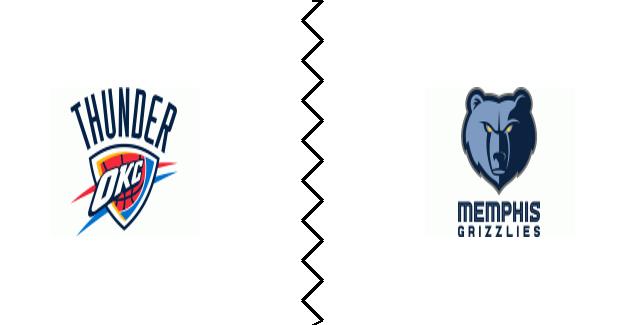2025-04-24 Oklahoma City at Memphis Matchup Preview

Oklahoma City's offensive rebounding prowess will be tested against a stout Memphis defense in this pivotal playoff matchup.


Matchup Overview
The Oklahoma City Thunder travel to Memphis to face the Grizzlies on April 24, 2025, for what promises to be a compelling playoff contest. Oklahoma City finished the regular season with an impressive 68-14 record, showcasing their dominance, while Memphis enters the game with a 48-34 record. This game will be a clash of strengths, with Oklahoma City's high-octane offense facing off against Memphis's defensive capabilities.
Oklahoma City Offensive Breakdown
Oklahoma City's offense during the regular season demonstrated a balanced approach. They secured 24.2% of available offensive rebounds. Their assist percentage of 60.2% indicates a focus on ball movement and finding the open man. They limited turnovers, with a turnover percentage of just 10.3%. This efficiency extends to the free-throw line, where they convert 81.9% of their attempts, contributing to an assist to turnover ratio of 2.3. However, in the playoffs, Oklahoma City has significantly elevated their offensive rebounding rate to 30.8%, while maintaining a similar assist percentage of 60.0% and lowering their turnover percentage to 9.6%, demonstrating increased focus and effectiveness in crucial moments.
Memphis Defensive Capabilities
Memphis possesses a strong defensive identity built on limiting opponent opportunities. During the regular season, the Grizzlies secured 75.0% of available defensive rebounds. Opponents only recorded an assist percentage of 64.5%, indicating a disruption of opponent ball movement, and forced a turnover percentage of 12.9%. During the playoffs, Memphis has struggled to maintain their regular season form, having a defensive rebound percentage of only 69.2%. They are still disrupting passing lanes, with opponents only having an assist percentage of 60.0%, and forcing a turnover percentage of 10.3%, showing they can still force errors, but their defensive rebounding will be crucial in this matchup.
Memphis Offensive Style
Memphis exhibits a strong offensive presence, particularly in securing offensive rebounds at a rate of 28.7%. Their commitment to ball movement is evident in their assist percentage of 63.5%, which shows an ability to share the ball effectively. They do struggle with turnovers, reflected in a turnover percentage of 13.1%, they are successful at the free-throw line, shooting 78.6%. However, in the playoffs, the Grizzlies have experienced a significant drop in offensive rebounding to 21.4% and a decrease in assist percentage to 49.3%, coupled with a high turnover percentage of 16.6%. This decrease in offensive cohesion could pose problems against a stout Thunder defense.
Oklahoma City Defensive Strategy
Oklahoma City's defensive approach stifles opponents in multiple facets of the game. They secure 74.7% of available defensive rebounds during the regular season. Opponents have an assist percentage of 64.9%, but they truly excel at forcing turnovers, shown with an opponent turnover percentage of 14.8%. Opponents convert 34.2% of their three-point attempts, and 77.4% of their free-throw attempts. During the playoffs, the Thunder have improved their defensive rebounding to 78.6% and have greatly improved their disruption of passing lanes, with opponents only having an assist percentage of 49.3% and forcing an opponent turnover percentage of 15.9%. They are limiting opponents to 24.6% shooting from three and 80.8% from the free-throw line.
Pace of Play
Oklahoma City plays at a pace of 100.0, which leans towards a controlled tempo, while Memphis prefers a slightly faster pace of 103.2. The contrast in preferred pace suggests a tactical battle, with each team aiming to dictate the game's rhythm. Oklahoma City will likely try to slow the game down and exploit their efficient offense, while Memphis will aim to speed the game up and capitalize on transition opportunities.
Key Matchup Factors
Oklahoma City's ability to secure offensive rebounds, demonstrated by their 30.8% offensive rebounding percentage in the playoffs, will be challenged by Memphis's defensive rebounding, which, despite dropping to 69.2% in the playoffs, will be a key area to watch. Additionally, Oklahoma City's stellar playoff defensive performance, allowing an opponent assist percentage of only 49.3%, will be crucial in containing Memphis's offensive ball movement. Memphis must find ways to overcome Oklahoma City's defensive pressure and exploit any weaknesses in their rotation.
Prediction
Oklahoma City's efficiency on both ends of the court, combined with their playoff performance, gives them a slight edge in this matchup. The Thunder's ability to control the pace and capitalize on second-chance opportunities will be critical to their success. Memphis's offensive struggles in the playoffs, particularly their turnover percentage and offensive rebounding, could be exploited by the Thunder's defense.
Score Prediction
Oklahoma City 121, Memphis 110